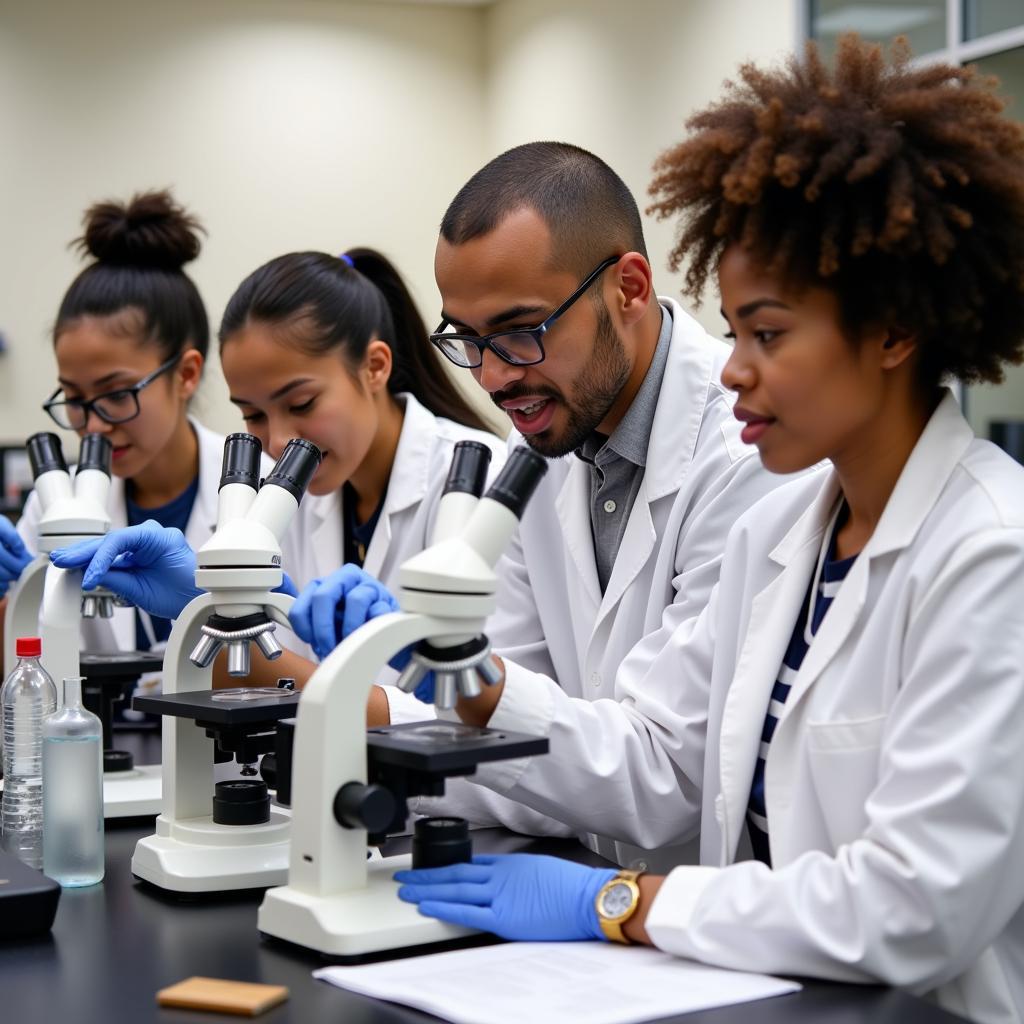The “biology, health, and society” major explores the intricate connections between human health, biological sciences, and the social fabric of our world. This dynamic field recognizes that our well-being is deeply entwined with the health of our planet and the communities we inhabit.
Exploring the Human Ecosystem: Where Biology Meets Society
This major delves into the complex interplay between biological systems and societal factors, examining how they influence each other. Students gain a holistic understanding of health, considering not just biological processes but also social determinants such as socioeconomic status, access to healthcare, and cultural influences.
 Students in a Biology, Health, and Society Lab
Students in a Biology, Health, and Society Lab
A Multidisciplinary Approach to Global Challenges
The curriculum typically spans a wide range of disciplines, including biology, public health, sociology, anthropology, and environmental science. This interdisciplinary approach equips students with a diverse toolkit to analyze and address pressing global challenges such as:
- Emerging infectious diseases: By understanding the biological origins of diseases and the social factors that contribute to their spread, students can contribute to developing effective prevention and intervention strategies.
- Health disparities: The major examines the social, economic, and environmental factors that create health inequities. This knowledge empowers students to advocate for policies and programs that promote health equity.
- Environmental health: Students explore the impact of environmental degradation on human health, from air and water pollution to climate change. This understanding is crucial for developing sustainable solutions that protect both planetary and human well-being.
Career Pathways: Making a Difference in the World
A degree in “biology, health, and society” opens doors to a wide array of fulfilling career paths where graduates can make a tangible difference. Some common career options include:
- Public Health Analyst: Analyze health data, identify trends, and develop programs to improve community health.
- Health Educator: Educate individuals and communities about health issues, disease prevention, and healthy lifestyle choices.
- Environmental Health Specialist: Investigate environmental hazards and develop strategies to minimize risks to human health.
- Healthcare Administrator: Manage healthcare facilities and programs, ensuring efficient and equitable delivery of care.
- Research Scientist: Conduct research to advance our understanding of the complex relationships between biology, health, and society.
Is a Biology, Health, and Society Major Right for You?
This major is an excellent fit for individuals who:
- Are passionate about health and social justice.
- Enjoy working collaboratively and across disciplines.
- Are critical thinkers with strong analytical skills.
- Possess excellent communication and problem-solving abilities.
- Are driven to make a positive impact on the world.
Conclusion: Shaping a Healthier and More Just Future
The “biology, health, and society” major empowers individuals to become agents of change, tackling complex challenges at the intersection of human health, scientific understanding, and societal well-being. By embracing this interdisciplinary perspective, graduates are well-equipped to contribute to a healthier, more equitable, and sustainable future for all.
For those seeking to make a meaningful difference in the world, the “biology, health and society” major offers a powerful pathway to unite their passions for science, health, and social justice.
FAQs about Biology, Health, and Society Major
1. What kind of research opportunities are available in this major?
Students can engage in research projects related to public health interventions, environmental health assessments, health disparities, and more. Many universities offer opportunities to work alongside faculty on ongoing research or pursue independent projects.
2. What are the prerequisites for applying to this major?
Prerequisites vary by university, but typically include coursework in biology, chemistry, and social sciences.
3. What are some common minors that complement this major?
Complementary minors include Global Health, Public Policy, Environmental Studies, Psychology, and Sociology.
4. What are some professional organizations related to this field?
Consider joining organizations like the American Public Health Association (APHA) or the Society for Health and Human Values.
5. What are some tips for success in this major?
Embrace the interdisciplinary nature of the field, actively seek research opportunities, develop strong communication skills, and network with professionals in related fields.
Interested in learning more about how other pre-health students are getting involved in organizations dedicated to global well-being? Check out our articles on UTSA pre dental society and pre dental society utsa.
For those passionate about biology and its impact, exploring the biology honor society might be of great interest.
If you’re considering a career in medicine, learn more about the supportive network and resources available through the pre medical society.
Need support in your journey towards a brighter and healthier future? Contact our dedicated team at Phone Number: 02043854663, Email: [email protected], or visit us at Zone 34, Bac Giang, 260000, Vietnam. We’re here to assist you 24/7.